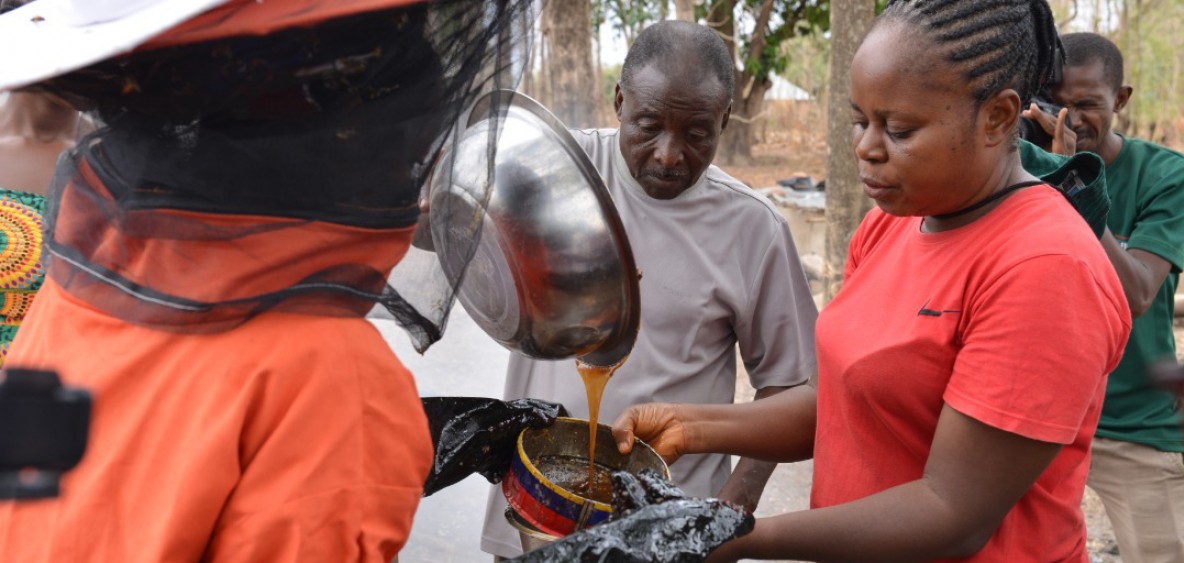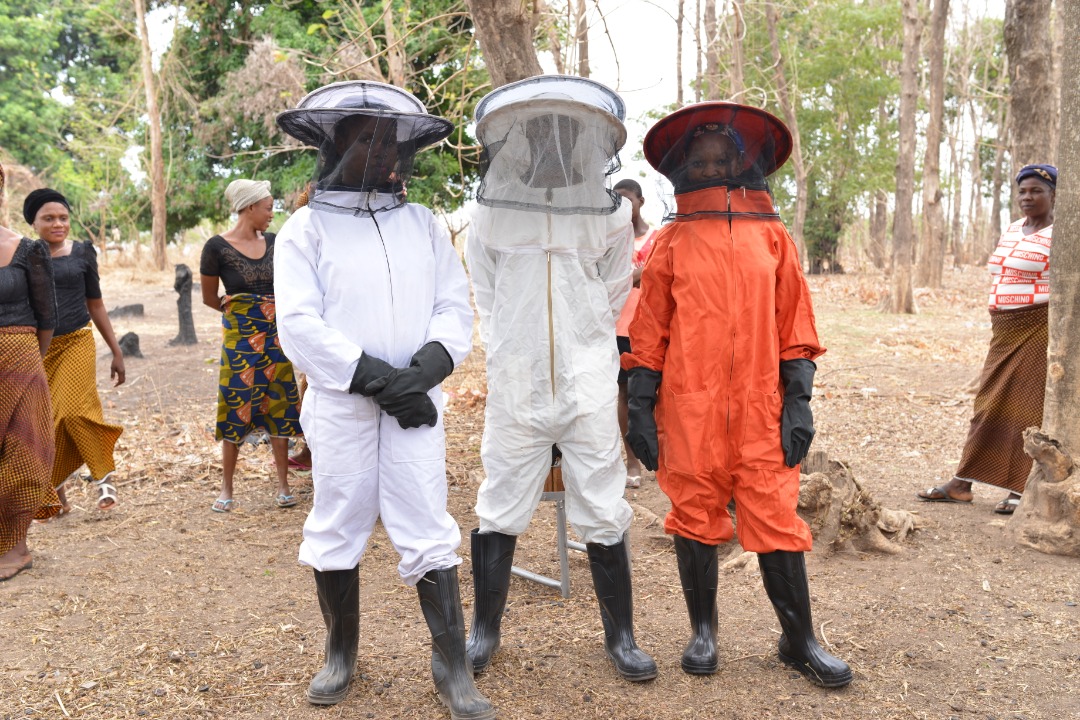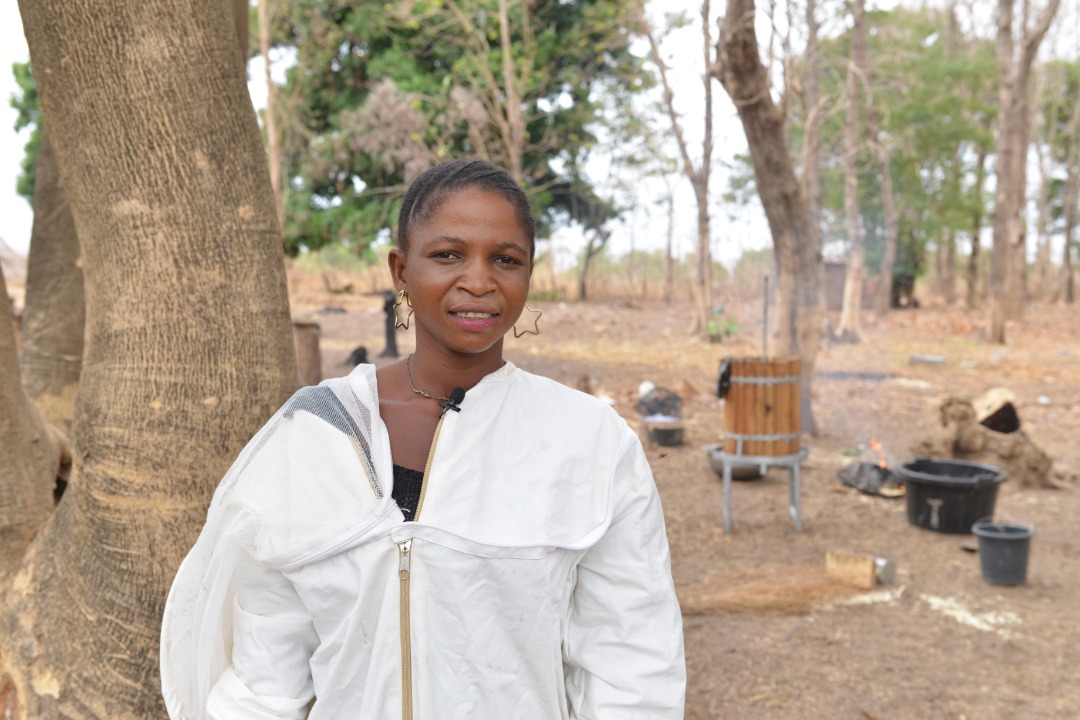 Women farmers in Benue State, Nigeria have already started harvesting and selling honey. Their first honey harvest earned the group $1,700 in additional income.
Women farmers in Benue State, Nigeria have already started harvesting and selling honey. Their first honey harvest earned the group $1,700 in additional income. Beekeeping initiatives for women in Africa are a win-win model that can benefit communities and the environment for years to come.
There’s an African proverb that says: When you empower a woman, you empower a generation.
This belief is reflected in the design and implementation of each of the 12 Resilient Food Systems (RFS) country projects. By enabling women to earn their own income, the projects witness the benefits trickle down to entire villages.
A cornerstone of the RFS programme is its commitment to closing the gender gap in agriculture by ensuring women have equal access to the inputs, services and training they need to reap the benefits of their labour. This endeavour goes beyond mere participation – it also envisages real transformation in the way women are empowered in households and the greater community.
One of the most critical ways the programme empowers women is by helping them earn an independent income. For women, earning an income can redefine the way they are viewed and treated within their community.
Of the many income-generating activities promoted by the RFS country projects (chicken rearing, dairy goat farming, oyster cultivation, to name a few), beekeeping and the production of honey (and other bee products) has been the most widely adopted. In Burundi, Eswatini, Ethiopia, Ghana, Malawi, Nigeria and Senegal, country projects have targeted women as the primary drivers of honey and bee product value chains.
The biggest obstacle? Convincing community members that beekeeping is not exclusively the domain of men. Traditionally, beekeeping has been both labour-intensive and dangerous. However, modern beehives and handling techniques have removed the sting from the work, and women have learned that there’s nothing to fear.
Prospective beekeepers receive training in how to build apiaries and colonise and manage hives. They are also connected to end markets for harvested honey and beeswax.
The direct benefits of beekeeping are numerous. Honey can be sold without additional processing, so there’s no extra cost to farmers. And because bees are pollinators, beekeeping contributes to a healthy ecosystem. Increasing the number of healthy hives increases crop yields, helps maintain biodiversity and speeds up land restoration.

In Nigeria, the Resilient Food Security project, implemented by the United Nations Development Programme (UNDP), has promoted beekeeping training across ten communities in Benue State.
In less than a year since their training, the women beekeepers have harvested more than 500 litres of honey, generating an additional income of $1,700 for the entire group.
One such beekeeper is thirty-year-old Janet Shija from the Buruku region in Nigeria’s Benue State. Once a yam farmer, last year, Janet participated in the beekeeping training and already earns more than she did from her yam crops. Janet can harvest 20 litres of honey from just one beehive. The income generated has raised her household’s standard of living and helps pay for her children’s school fees.

We already know women are vital to tackling environmental challenges. In Eswatini, beekeeping has been used as an entry point for empowering women to take a more active role in land rehabilitation and reforestation.
By integrating beekeeping into tree-growing efforts for reforestation, the RFS Eswatini project, implemented by the International Fund for Agricultural Development (IFAD), has raised awareness of the connections between bees as pollinators and forest health. Through awareness-raising and training, women have become crucial custodians of the emerging forest flora and realise the positive impact of bee colonies on their livelihoods and the environment.
In Senegal’s Saloum Delta, women beekeepers play an important part in maintaining healthy mangrove ecosystems. Since the 1970s, Senegal’s mangroves have disappeared at an alarming rate due to droughts and deforestation. Several replanting projects have been ongoing since 2008, and communities are aware of the necessity of mangroves for healthy soil and better water quality.
Supported by the RFS Senegal project, which IFAD implements in partnership with the United Nations Industrial Development Organization (UNIDO), Senegalese women beekeepers are now contributing to the mangrove restoration efforts as new guardians of bee colonies. This has created a virtuous cycle: these women now have a sustainable and consistent income stream, which in turn reduces their reliance on the mangrove forests for income while simultaneously improving mangrove forest health by nurturing and growing a population of vital pollinators.
As an accessible income-generating activity that supports women’s economic empowerment, protects local ecosystems, and improves agricultural yields, the beekeeping training initiatives within the RFS projects have been met with a lot of enthusiasm.
Within each project, the demand for more training grows. As beekeeping becomes more popular within rural smallholder communities, the gains for both the community and the environment will be evident for generations to come.
Subscribe to our monthly newsletter to receive updates on stories directly from the field across all our projects, upcoming events, new resources, and more.